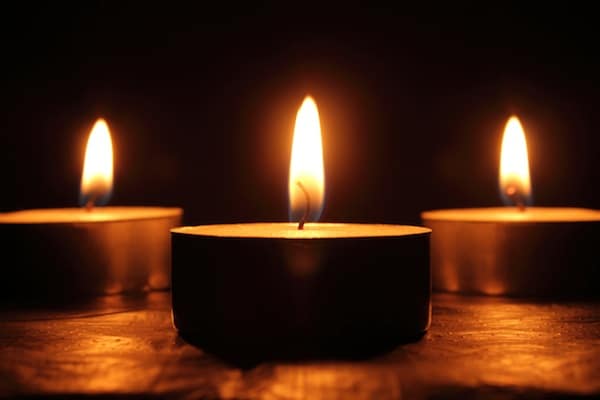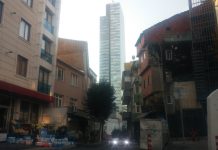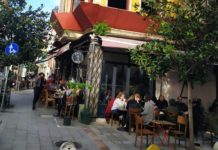
All day long, in fits and waves, there had been blackouts. And not just in one part of Istanbul, but across the whole vast city; in Ankara, Izmir – in fact, across the whole bloody country. News reports indicated that officials were still looking for the cause of the massive outage, but were not ruling out a possible act of terrorism.
So the whole day, as you can imagine, was topsy-turvy, off kilter. Even Istanbul, no stranger to lurking disaster, was paralyzed: for several hours, the metro lines was shut down, there was virtually no Internet access, traffic lights were out, leaving the motorists at the intersections to their own perilous devices.
At the school, we were supposed to have a workshop, “Technology in the Classroom.” This may come as a shock, but thanks to the blackout, it was canceled.
By late afternoon, however, it appeared that things had settled back to almost-normal. In most places, it seemed, the power was back. The traffic lights were working, phone and Internet were online – the city was moving again.
“How were things at Dolmabahçe?” I asked Özge. She works at the famous palace.
“It was OK,” she said. They had a back-up generator. “But the traffic everywhere was terrible.”
We were relieved to see that we had power at the flat. But you never know with these things, so we set out to take advantage of having electricity while it was there to be had. We powered our mobiles and laptops, and Özge set a round of dishes going in the washer. I sent a message to my student, reassuring her that I was online and would hopefully be ready for our lesson at 8:30. How were things her way?
It was just after I sent this message that the lights went out, as well as the computer, and the apartment went dark.
“Arggh!” We said almost in unison. Not again.
We went to the balcony and looked outside. It was dusk, and the city was bathed in shadows. All the buildings up and down the street were dark as well, except the Starbucks on the corner. It was brightly lit and functioning as normal.
“They probably have a generator, the bastards,” I said. We felt like Frank Gallagher on “Shameless,” who is always railing against the “evils” of Starbucks.
“What would Frank Gallagher say in this situation?” I joked to Özge. “He would probably say, ‘Forget terrorism! This is all the workings of Starbucks! Don’t you see? They deliberately forced this power outage so that everyone would be forced to go to Starbucks, buy coffee – because they have no other choice! That’s how it all starts, my friend! First, it’s a power outage, then next thing we’re all on our way to becoming slaves to corporate coffee!”
At least we were in the mood to joke. But we were lucky; we were home, after all. Down in the streets, people in their cars were still trying to get where they were going, navigating the unlit streets, honking horns, snaking slowly to avoid possible pedestrians stranded in the dark.
The atmosphere felt vaguely sinister, spooky even, like those clips you saw of the great NYC blackout of 1977, the infamous Summer of Sam.
We could see that the Migros was open, albeit without lights. Özge suggested I run down and get some candles, and a few beers.
In the hallway, the building manager was putting candles in the stairwell. The lift, of course, wasn’t working. Downstairs, the door wouldn’t open, since it has an electric lock. A woman was standing outside with a bag of groceries, hoping somebody would open the door. I had my key, and opened the door the old-fashioned way. The woman thanked me as I held the door to let her in.
Across the street at the Migros, they were sold out of candles.
I grabbed some cans of Efes, which were still cold, from the fridge, paid and went up the street to another market. The boy there was just closing the doors. I mouthed the Turkish word for candles. He shook his head. They were all sold out, too.
I snapped my fingers, an idea flashing. There was the Benzin Bar, just nearby. The guys there knew me well, so I went in. The whole bar was dark, except for tiny candles placed at each table. There were only a few customers.
“Hello, my friend!” the garcon said, shaking my hand.
“Mum var mı?” I asked. The Turkish word for candle is “mum.”
“Sorry,” he said, shaking his head.
Jesus, was the whole supply of candles in the neighborhood already gone? Not one fuckin’ candle.
Back at the flat, I ran into the building manager, who was still setting out candles. They were very thin, cheap candles with dim, puny light. Still, they were better than nothing. I asked if he had a few to spare. He was fresh out too.
So Özge and I sat on the balcony, where there was at least the reflected light from the car headlights. We drank beer and played with the cat, Ginger, who seemed to sense that things were off somehow, but seemed not too bothered about it.
“Well, this is a chance for us to actually talk,” Özge teased. “No TV, no Internet, no distractions.”
So we talked, sipping on the beer, smoking cigarettes, and looking out at the disordered darkness that had fallen on the city. I thought of that old Bob Dylan song, “When the Night Comes Falling from the Sky,” its insistent tone crying out toward vanished heavens. Actually I’d always preferred the Jeff Healey Band version. That was the one playing in my head. I thought about getting out the guitar and playing for something to do, but it was too dark to see the chords.
Anyway, we talked about the news of the prosecutor in the Berkin Elvan case who had been kidnapped at a courthouse that day by a leftist “terrorist” group and was being held hostage. The group reportedly wanted the police officers responsible for the death of Berkin Elvan to publicly confess wrongdoing. It was all connected to the anti-government protests over in Taksim Square two years ago. Some speculated if the power outage had made it possible for the kidnapping, since the metal detectors at the courthouse would have been disabled. We wondered if the prosecutor would be freed, or if he was already dead.
We wondered if there were other causes behind the blackout. Some speculated the PKK, while others suspected Syria or even Iran. In the darkness, the imagination grasped at disturbing straws, seeing a squadron of jets streak across the night, dropping bombs in a surprise air raid. We even wondered if the government itself could be behind it, putting out the electricity, which would then allow itself to conveniently showcase its “efficiency” in a quick response. As you can see, here in Turkey, conspiracy theories are, arguably more so than football, the true national pastime.
“When the Night Comes Falling … From the Sky …”
Anyway, when the lights go out, the primal energies of the imagination are released. And a lot of boredom. The cause was probably more mundane. I told Özge about the rolling blackouts that California experienced back in 2000, when I first started reporting at the newspaper, and how a big reason for those blackouts was that California’s grid wasn’t able to support all the increased demand. So it could have been something like that too, some technical issue.
We were still ruminating in the dark, when suddenly, across the street, the lights in the shops snapped back on. A moment or so later, the lights in our kitchen came back. With relief, we felt things return suddenly to normal, all those uncertainties and speculations already forgotten.
****
In the morning, it was a brilliant spring day and everything appeared to have returned to normal. Then, just as I was coming out the gate, I heard a loud smash. Two cars had collided, one of them had tried to enter the road from a side street and the oncoming driver didn’t see in time. Well, the day had started with a bang. But it was a fairly minor fender bender, and no one appeared to be injured, so I just walked on up the hill to get the bus into Kadıköy.
In Kadıköy, the people were going about their day. I got another bus to Suadiye. A blind man, cane in hand, was getting on. He sat up front and I took the seat next to him. He asked if I could tell him when the bus stopped at Caddebostan, and I told him I would.
As the bus rolled on out of Kadıköy, past Kızıltoprak, past the other neighborhoods, until presently we reached Caddebostan. I went to tell the blind man, but he had heard the announcement on the intercom and didn’t need my help. Clutching his cane, he excused himself and squeezed past onto the aisle and got out at the front of the bus.
As the door shut and we moved on, I noticed a young man at the busy intersection helping the blind man cross the street. There is no great philosophical truth to be offered here, except to say that it felt oddly appropriate, right, to be sitting next to a blind passenger on the bus on the morning after the whole nation spent the previous day in the dark. And outside, it was a brilliant morning, the sun cutting along the edges of the sea.
James Tressler is a writer and teacher whose books, including “Lost Coast D.A.,” “Conversations in Prague,” and “Letters from Istanbul, Vol. 1 and 2” can be found at Lulu.com. He lives in Istanbul.










